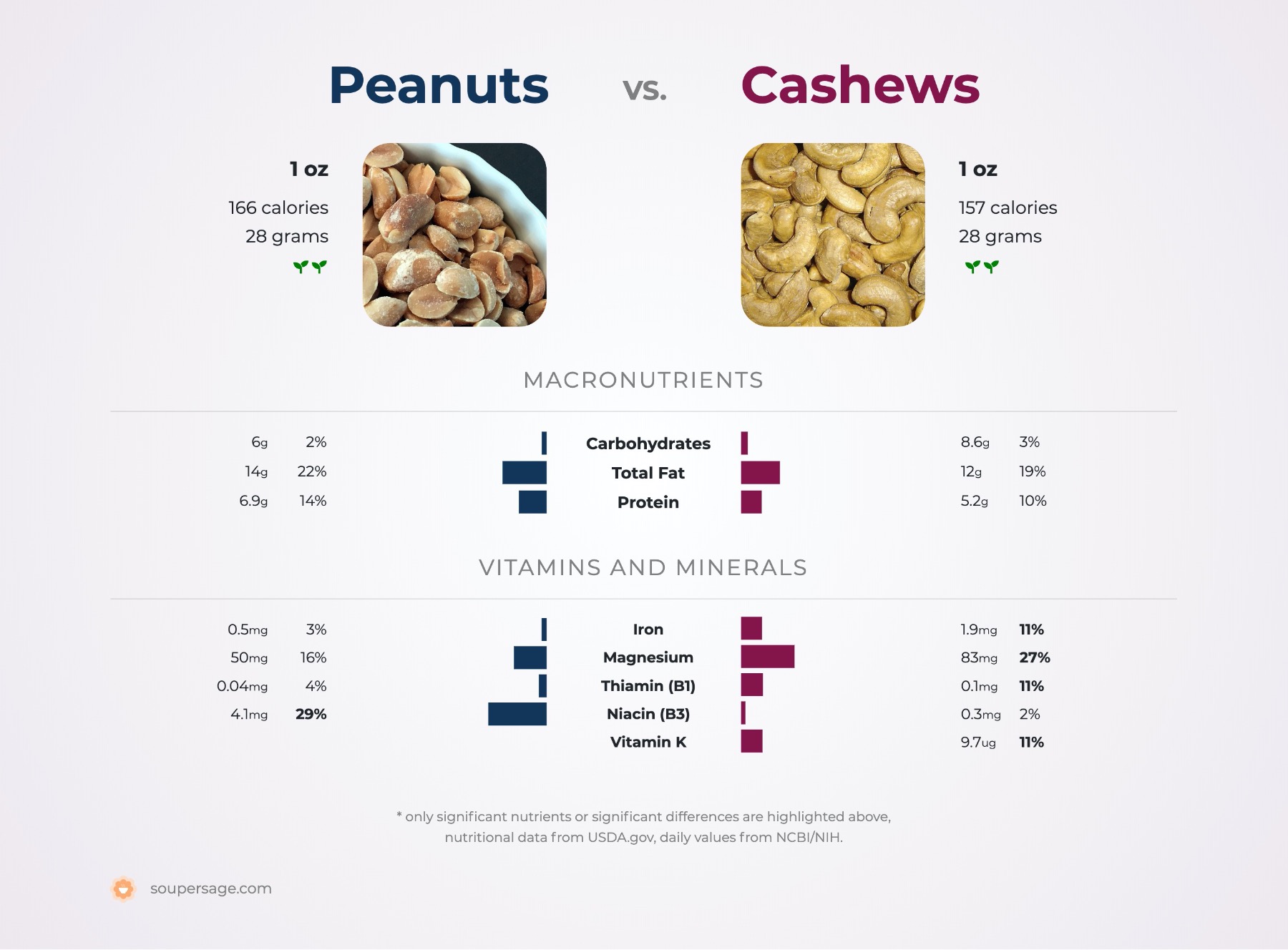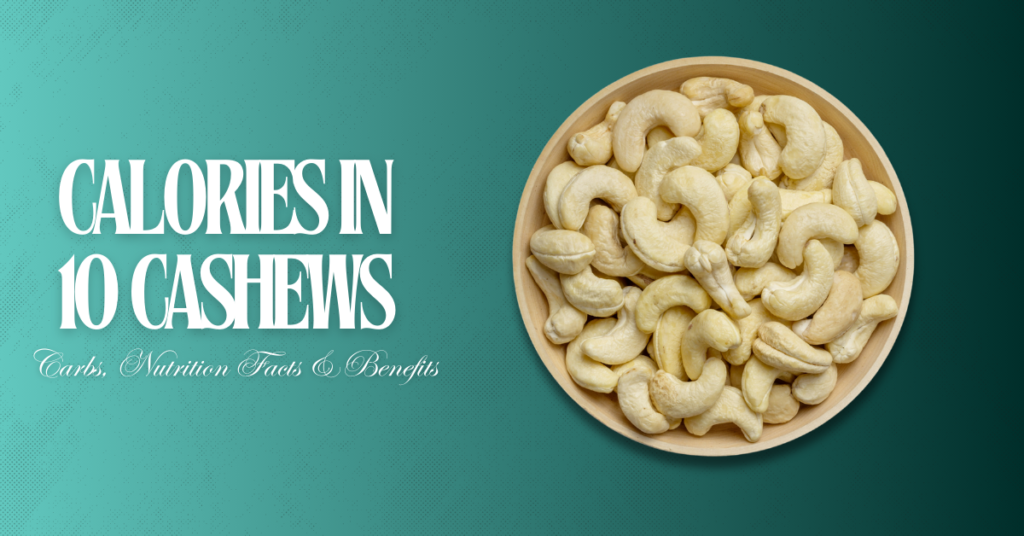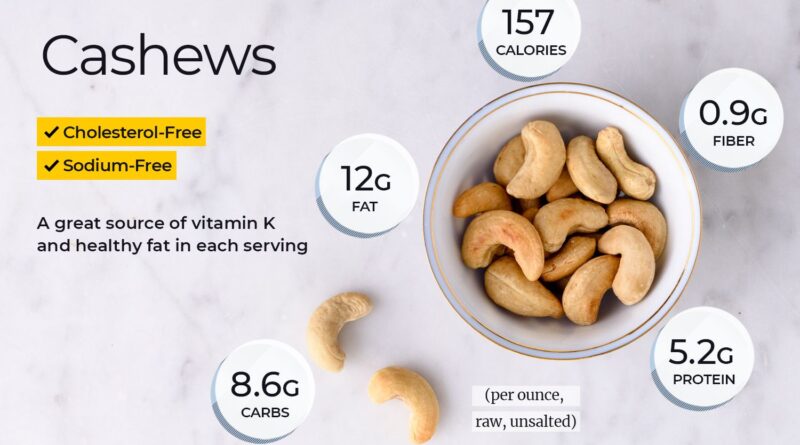10 Cashews Nutrition Facts: Boost Your Health with Every Bite
Cashews are not just tasty snacks; they are nutritional powerhouses. Packed with essential nutrients, they offer numerous health benefits.
Eating cashews can be a delightful way to boost your diet. These kidney-shaped nuts are rich in vitamins, minerals, and healthy fats. They support heart health, improve brain function, and help maintain strong bones. Cashews are also a great source of protein, making them perfect for vegetarians and vegans.
Including cashews in your diet can provide a range of health benefits that you might not be aware of. In this post, we will explore the top 10 nutritional benefits of cashews. Stay with us to learn how these small nuts can make a big difference in your health.
Nutritional Profile
Cashews are not just a delicious snack; they are also packed with essential nutrients. Understanding the nutritional profile of 10 cashews can help you appreciate their health benefits. This profile includes calories, macronutrients, vitamins, and minerals, which all play a crucial role in your diet.
Calories And Macronutrients
Eating 10 cashews provides a balanced mix of calories and macronutrients. These small nuts are energy-dense, making them a great option for a quick snack. Here’s a breakdown of the calories and main macronutrients found in 10 cashews:
- Calories: Approximately 55 calories
- Protein: Around 1.5 grams
- Fat: About 4.5 grams
- Carbohydrates: Roughly 3 grams
- Fiber: Approximately 0.3 grams
These numbers indicate that cashews are a good source of healthy fats and provide a moderate amount of protein and carbs. The fats in cashews are mostly unsaturated, which are better for heart health. The protein content helps in muscle repair and growth, while the carbs provide quick energy.
Vitamins And Minerals
Cashews are not just about calories and macronutrients; they are also rich in essential vitamins and minerals. Including 10 cashews in your diet can contribute to your daily nutrient needs. Here’s a closer look at the vitamins and minerals present in 10 cashews:
| Vitamin/Mineral | Amount | % Daily Value |
|---|---|---|
| Vitamin E | 0.1 mg | 1% |
| Vitamin K | 2 mcg | 2% |
| Magnesium | 12 mg | 3% |
| Zinc | 0.5 mg | 4% |
| Iron | 0.8 mg | 4% |
As seen in the table, cashews are particularly rich in minerals like magnesium, zinc, and iron. Magnesium helps with bone health and energy production. Zinc supports the immune system, and iron is vital for transporting oxygen in the blood. Vitamin E and K are important for skin health and blood clotting, respectively.
:max_bytes(150000):strip_icc()/cashew_annotated-10234814a2d44a139bb8d25acfc1b55a.jpg)
Health Benefits
Cashews are not just delicious; they are packed with nutrients that offer numerous health benefits. These kidney-shaped nuts are rich in vitamins, minerals, and antioxidants. Including cashews in your diet can improve your overall well-being. Let’s explore the specific health benefits of cashews, starting with heart health and bone strength.
Heart Health
Cashews are excellent for heart health due to their nutrient-rich profile. These nuts are high in monounsaturated and polyunsaturated fats, which are beneficial for cardiovascular health.
- They help reduce bad cholesterol (LDL) levels.
- They increase good cholesterol (HDL) levels.
Cashews also contain significant amounts of magnesium. Magnesium helps regulate blood pressure and supports a healthy heart rhythm. A diet rich in magnesium can lower the risk of heart disease. Here is a table highlighting key nutrients in cashews that benefit heart health:
| Nutrient | Benefit |
|---|---|
| Monounsaturated Fats | Lower bad cholesterol |
| Polyunsaturated Fats | Improve blood cholesterol levels |
| Magnesium | Regulate blood pressure |
Additionally, cashews are rich in antioxidants like vitamin E, which can help prevent oxidative damage to heart cells. Including a handful of cashews in your diet can be a tasty way to support heart health.
Bone Strength
Cashews are also beneficial for bone strength. They are rich in minerals like calcium, magnesium, and phosphorus.
- Calcium is essential for bone health.
- Magnesium helps in the absorption of calcium.
- Phosphorus supports the structure and strength of bones.
Cashews contain a good amount of vitamin K, which plays a crucial role in bone health. Vitamin K helps in the binding of calcium to the bone matrix, making bones stronger. Here is a table showing the bone-strengthening nutrients in cashews:
| Nutrient | Benefit |
|---|---|
| Calcium | Strengthens bones |
| Magnesium | Aids calcium absorption |
| Phosphorus | Supports bone structure |
| Vitamin K | Enhances bone density |
Including cashews in your diet can help maintain strong and healthy bones. A simple handful a day can provide essential nutrients for your bone health.
Weight Management
Many people struggle with weight management. Cashews, a popular nut, can be a helpful addition to your diet. They are rich in nutrients and can support your weight management goals. Understanding how cashews affect satiety and caloric intake can help you make informed choices.
Satiety Factors
Cashews can help you feel full for longer periods. This is due to their high content of healthy fats, protein, and fiber. These nutrients work together to slow down digestion and keep you satisfied.
- Healthy Fats: Cashews contain monounsaturated and polyunsaturated fats. These fats are good for your heart and help you feel full.
- Protein: A serving of cashews provides a good amount of protein. Protein is known to increase satiety and reduce overall food intake.
- Fiber: The fiber in cashews helps regulate digestion and keeps you feeling full.
Including cashews in your meals can reduce cravings and snack attacks. They are a great addition to breakfast, lunch, or as a snack. Here’s a simple table showing the nutrients in a 1-ounce serving of cashews:
| Nutrient | Amount |
|---|---|
| Calories | 157 |
| Protein | 5 grams |
| Fat | 12 grams |
| Fiber | 1 gram |
Cashews are also versatile. You can add them to salads, stir-fries, or simply eat them on their own. This makes them an easy and convenient option for those looking to manage their weight.
Caloric Density
Cashews are calorie-dense. This means they pack a lot of calories in a small amount. While this might seem like a drawback, it can be beneficial for weight management if consumed in moderation. Here’s why:
- Energy Boost: The high-calorie content of cashews can provide a quick energy boost. This is useful for active individuals or those needing a mid-day pick-me-up.
- Nutrient-Rich: Each calorie in cashews is packed with nutrients. This includes vitamins, minerals, and antioxidants.
- Small Portions: Because they are calorie-dense, you don’t need to eat a lot to feel satisfied. This can help control portion sizes and prevent overeating.
Balancing caloric intake is crucial. While cashews are high in calories, their nutritional benefits outweigh this. Eating small portions can help you enjoy the benefits without over-consuming calories. Here’s a quick tip: Measure your servings. A small handful (about 1 ounce) is enough to reap the benefits without going overboard. Combining cashews with other nutrient-dense foods can also help balance your diet.

Antioxidant Properties
Cashews are not just delicious snacks; they are packed with nutrients that benefit your health. Among these, their antioxidant properties stand out. Antioxidants play a crucial role in maintaining your well-being by protecting your body from harmful molecules known as free radicals.
Role Of Antioxidants
Antioxidants in cashews help neutralize free radicals. This is important because free radicals can damage cells and contribute to aging and diseases. Cashews contain several types of antioxidants, including:
- Vitamin E
- Vitamin K
- Selenium
These antioxidants work together to protect your body. Vitamin E, for example, helps maintain healthy skin by preventing oxidative stress. Selenium supports thyroid function and boosts the immune system. Here’s a table summarizing the antioxidants and their benefits:
| Antioxidant | Benefit |
|---|---|
| Vitamin E | Protects skin |
| Vitamin K | Supports bone health |
| Selenium | Boosts immunity |
Antioxidants also help in preventing chronic diseases. For instance, they reduce the risk of heart disease by preventing the oxidation of LDL cholesterol. This is vital since oxidized LDL cholesterol can lead to artery blockage. By including cashews in your diet, you ensure a steady intake of these essential antioxidants.
Impact On Inflammation
Inflammation is a natural response to injury or infection. But chronic inflammation can lead to various diseases. Cashews’ antioxidants help reduce inflammation. This is because they neutralize free radicals, which can cause inflammation. Here are some specific ways cashews impact inflammation:
- Oleic Acid: This monounsaturated fat in cashews reduces inflammatory markers in the body.
- Magnesium: This mineral helps regulate inflammatory responses.
- Copper: This trace mineral is essential for anti-inflammatory enzymes.
Oleic acid in cashews is the same healthy fat found in olive oil. It has been shown to lower levels of C-reactive protein (CRP), a marker of inflammation. Magnesium in cashews also plays a role. It helps relax blood vessels, reducing inflammation and improving circulation. Copper supports the function of antioxidant enzymes, which fight inflammation at the cellular level. By consuming cashews, you can manage inflammation naturally. This can lead to a reduced risk of conditions like arthritis and heart disease. So, adding cashews to your diet is a tasty way to keep inflammation at bay.
Dietary Considerations
Cashews are a popular snack enjoyed by many for their creamy texture and rich taste. These nuts are not only delicious but also packed with nutrients. Understanding the dietary considerations for cashews is essential for making informed choices about including them in your diet.
Allergies And Intolerances
Some individuals may experience allergies or intolerances to cashews. Cashew allergies are part of the tree nut allergy category and can cause serious reactions. Symptoms can range from mild to severe and may include:
- Hives or skin rashes
- Swelling of the lips, face, or throat
- Stomach pain, nausea, or vomiting
- Difficulty breathing or anaphylaxis
For those with cashew allergies, it is crucial to avoid all forms of cashews and products containing them. Always check food labels carefully. Cross-contamination can occur in facilities that process multiple types of nuts. Cashew intolerance, on the other hand, is less severe but can still cause discomfort. Symptoms may include digestive issues like bloating, gas, or diarrhea. Unlike allergies, intolerances do not involve the immune system and are often dose-dependent.
| Symptom | Allergy | Intolerance |
|---|---|---|
| Hives or Skin Rashes | Common | Rare |
| Swelling | Common | Rare |
| Stomach Issues | Possible | Common |
| Difficulty Breathing | Possible | Rare |
If you suspect an allergy or intolerance, consult a healthcare professional. They can provide testing and guidance on managing your condition.
Vegan And Vegetarian Options
Cashews are a fantastic addition to vegan and vegetarian diets. They offer a plant-based source of protein, healthy fats, and essential nutrients. Cashews can be used in a variety of ways to enhance your meals:
- Raw or roasted: Enjoy cashews as a simple snack or add them to trail mixes.
- Nut butter: Cashew butter is a creamy alternative to peanut butter and can be spread on toast or used in recipes.
- Dairy alternatives: Cashews can be blended into a smooth and creamy milk substitute. Cashew milk is great for cereals, smoothies, and coffee.
- Cooking and baking: Use cashews to make rich sauces, creamy soups, or dairy-free cheesecakes.
Here are some nutritional benefits of cashews for vegans and vegetarians:
| Nutrient | Benefit |
|---|---|
| Protein | Supports muscle repair and growth |
| Healthy Fats | Promotes heart health |
| Magnesium | Supports bone health and energy production |
| Iron | Helps prevent anemia |
Including cashews in your diet can help meet your nutritional needs while enjoying versatile and delicious food options. Whether you are looking for snacks, cooking ingredients, or dairy alternatives, cashews can fit seamlessly into your vegan or vegetarian lifestyle.

Culinary Uses
Cashews are not only delicious but also packed with nutrients. They are rich in healthy fats, protein, vitamins, and minerals. Their versatility makes them a favorite in many kitchens around the world. From snacking to cooking, cashews can be used in various ways to enhance your meals and snacks.
Snacking Ideas
Cashews make a perfect snack, whether you’re on the go or at home. Here are some creative snacking ideas:
- Roasted Cashews: Simply roast cashews with a pinch of salt for a crunchy treat.
- Spiced Cashews: Toss them with your favorite spices like cinnamon, chili powder, or garlic powder before roasting.
- Cashew Trail Mix: Combine cashews with dried fruits, dark chocolate chips, and other nuts.
- Cashew Butter: Spread cashew butter on toast or use it as a dip for apple slices.
- Honey Glazed Cashews: Mix cashews with honey and a bit of sea salt for a sweet and salty snack.
Here is a simple table showcasing the nutritional content of a 1-ounce serving of cashews:
| Nutrient | Amount |
|---|---|
| Calories | 157 |
| Protein | 5 grams |
| Fat | 12 grams |
| Carbohydrates | 9 grams |
| Fiber | 1 gram |
| Sugar | 1 gram |
Cooking Applications
Cashews are a versatile ingredient in cooking. They can be used in savory dishes, desserts, and everything in between. Here are some cooking applications:
- Creamy Sauces: Blend soaked cashews to create a creamy base for sauces and soups.
- Stir-Fries: Add whole or chopped cashews to vegetable or chicken stir-fries for added crunch and flavor.
- Cashew Cheese: Blend cashews with nutritional yeast, lemon juice, and garlic for a dairy-free cheese alternative.
- Curries: Cashews are often used in Indian curries to add richness and texture.
- Baking: Use cashew butter or chopped cashews in cookies, brownies, and other baked goods.
Here are some popular dishes that feature cashews:
- Cashew Chicken: A classic Chinese-American dish with cashews, chicken, and vegetables in a savory sauce.
- Vegan Alfredo Sauce: Made with blended cashews, garlic, and nutritional yeast for a creamy, dairy-free sauce.
- Kaju Katli: An Indian sweet made with ground cashews and sugar.
- Cashew Pesto: A twist on traditional pesto, using cashews instead of pine nuts.
- Cashew Rice: A flavorful rice dish with cashews, vegetables, and spices.
These are just a few ways you can incorporate cashews into your cooking. Their rich flavor and creamy texture make them a versatile addition to many recipes.
Sourcing And Quality
Cashews are not only delicious but also packed with nutrients. Understanding the sourcing and quality of cashews helps ensure that you get the best nutritional value. Let’s explore the different types of cashews and the distinction between organic and conventional varieties.
Types Of Cashews
Cashews come in various types, primarily categorized by their size, color, and quality. Here are some common types:
- Whole Cashews: These are the highest quality cashews, usually large and whole. They are perfect for snacking and cooking.
- Split Cashews: These cashews are broken pieces of whole cashews. They are often used in recipes where appearance is not a concern.
- Pieces: Cashew pieces are smaller and often used in granola, trail mix, or baking.
- Cashew Meal: Ground cashews, used as a flour substitute in gluten-free recipes.
Cashews are also graded based on their color and size. The grading system includes:
| Grade | Characteristics |
|---|---|
| W-180 | Large, whole, white cashews (highest quality) |
| W-210 | Smaller whole white cashews |
| W-240 | Medium whole white cashews |
| W-320 | Smaller whole white cashews (most common) |
The type and grade of cashews you choose can affect their taste and nutritional value. Higher-grade cashews are usually fresher and more flavorful.
Organic Vs Conventional
The choice between organic and conventional cashews depends on your preferences and values. Here are some differences:
- Organic Cashews: Grown without synthetic pesticides or fertilizers. They are often considered healthier and more environmentally friendly. Organic farming practices support biodiversity and soil health.
- Conventional Cashews: These cashews may be grown using synthetic chemicals. They are often less expensive and more readily available. Conventional farming can lead to higher yields and more consistent quality.
Organic cashews often come with certifications like USDA Organic or EU Organic, ensuring they meet specific standards. These certifications can give you peace of mind about the farming practices used. Here is a comparison table for a quick overview:
| Aspect | Organic Cashews | Conventional Cashews |
|---|---|---|
| Farming Practices | Natural, no synthetic chemicals | May use synthetic pesticides and fertilizers |
| Environmental Impact | Eco-friendly, supports biodiversity | Can have a higher environmental footprint |
| Price | Usually higher | Generally lower |
| Availability | Less common | More common |
Both organic and conventional cashews offer nutritional benefits. Your choice may depend on your budget, availability, and commitment to sustainable practices.
Storage Tips
Storing cashews the right way ensures they stay fresh and delicious. Proper storage also keeps their nutrients intact. Here are some storage tips to help you enjoy your cashews longer.
Best Practices
Follow these best practices to keep your cashews fresh:
- Keep them dry: Moisture can spoil cashews quickly. Store them in a dry place.
- Use airtight containers: Keep cashews in airtight containers to prevent air exposure.
- Store in a cool place: Heat can make cashews go bad. Store them in a cool, dark place.
Here are a few more tips:
- Refrigerate for longer storage: If you plan to keep cashews for more than a month, refrigerate them.
- Freeze for extended storage: For the longest shelf life, freeze your cashews.
Here is a quick reference table for storage conditions:
| Storage Method | Recommended Duration |
|---|---|
| Room Temperature | 1 month |
| Refrigerator | 6 months |
| Freezer | 1 year |
Shelf Life
Cashews have a good shelf life, but it depends on how you store them. Here is a detailed look at their shelf life:
- Room temperature: Cashews can last up to one month at room temperature. They should be kept in a cool, dry place.
- Refrigeration: When stored in the fridge, cashews can stay fresh for up to six months. Use airtight containers to avoid moisture.
- Freezing: In the freezer, cashews can last up to a year. Keep them in freezer-safe bags or containers.
Signs of spoilage to watch for:
- Rancid smell: If cashews smell off, they may be rancid.
- Changes in taste: A bitter or sour taste means the cashews are no longer good.
- Mold: Discard any cashews that show signs of mold.
By following these storage tips, you can keep your cashews fresh and enjoy their nutritional benefits longer.
Frequently Asked Questions
What Are The Nutritional Benefits Of Cashews?
Cashews are rich in protein, healthy fats, and essential minerals. They contain vitamins E, K, and B6. These nutrients support heart health, brain function, and immune system.
How Many Calories In A Serving Of Cashews?
A one-ounce serving of cashews contains approximately 157 calories. This serving provides energy and essential nutrients for the body.
Are Cashews Good For Heart Health?
Yes, cashews are good for heart health. They contain monounsaturated fats that help lower bad cholesterol levels and improve overall heart function.
Do Cashews Help With Weight Management?
Cashews can help with weight management when consumed in moderation. They provide healthy fats and protein, which help keep you full.
Conclusion
Cashews are a nutritious and tasty snack. They offer many health benefits. From providing essential vitamins to boosting heart health, cashews are valuable. Including them in your diet can be a smart choice. They are easy to add to various dishes too.
Enjoy them raw or roasted, in salads or desserts. Cashews can contribute to a balanced diet. So, next time you’re hungry, consider reaching for a handful of cashews. Your body will thank you.




